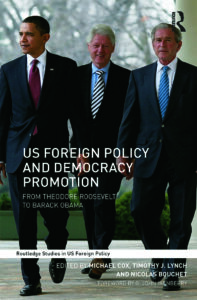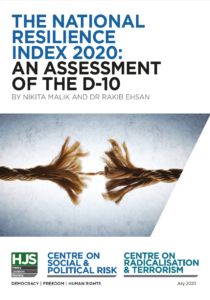
A pro-democracy foreign policy does not entail subordinating U.S. foreign policy objectives to human rights imperatives as any new administration will need to weigh these concerns alongside its full array of strategic, diplomatic and economic interests, argues Council on Foreign Relations fellow Stewart Patrick.
At times, the United States will need to hold its nose, working with unsavory regimes. But it should never remain silent. At the height of the Cold War, as Jay Nordlinger pointed out, Ronald Reagan repeatedly handed Soviet premier Mikhail Gorbachev a list of dissidents America wanted freed. No nation should get a free pass, he writes for World Politics Review.
Europe and America need a transatlantic “New Deal” to adapt our partnership to global upheavals and in line with the depth of our bonds, common values and shared interests, according to French minister of foreign affairs Jean-Yves Le Drian and his German counterpart Heiko Maas. There is now scope for Europe and the United States to remain guarantors for peace and stability, democracy, the rule of law and human rights in the world, they write for The Washington Post.

The Chinese Communist worker. Pop art retro vector Credit: CSP
Daniel Baer, a senior fellow at the Carnegie Endowment for International Peace said Joe Biden has made it clear that he will make “democracy and human rights central to US foreign policy”, Al Jazeera reports:
Similarly, Jeffrey Wilson, research director of the Perth USAsia Centre expects the policy focus on China to shift away from trade to other areas including “concerns regarding political rights under the Chinese Communist Party (CCP), such as Xinjiang and Hong Kong, and economic issues, such as commercial espionage and the security of the technology ecosystem”.
One of his most innovative ideas is to convene a world summit on democracy to address the growth of authoritarianism globally, adds one observer.
 The next administration should make strengthening democracy overseas a pillar of its foreign policy because doing so embodies our nation’s core ideals and is imperative to U.S. security and economic well-being, according to Brookings analyst Patrick W. Quirk and Daniel Twining, President of the International Republican Institute. A world in which authoritarians control the balance of power would gravely endanger domestic freedoms, they write for the Brookings Institution, making five recommendations for supporting democracy abroad:
The next administration should make strengthening democracy overseas a pillar of its foreign policy because doing so embodies our nation’s core ideals and is imperative to U.S. security and economic well-being, according to Brookings analyst Patrick W. Quirk and Daniel Twining, President of the International Republican Institute. A world in which authoritarians control the balance of power would gravely endanger domestic freedoms, they write for the Brookings Institution, making five recommendations for supporting democracy abroad:
- First, the agenda’s keystone should be to bolster core institutions of democracy in strategically important countries. This includes helping strengthen electoral institutions, political parties, civil society, independent media, legislative bodies, and judiciaries, particularly given the requirement to operate effectively in a digital environment. A small investment relative to defense spending, this support is proven to help governments deliver for citizens. Stronger and more responsive governmental institutions, political parties, media, and robust civil society also position countries to effectively detect, expose, and counter foreign malign influence. Sufficiently resourcing the National Endowment for Democracy (NED), the State Department’s Bureau of Democracy, Human Rights and Labor, and the U.S. Agency for International Development’s democracy and governance programming will be central to this effort..
-

National Endowment for Democracy (NED)
Second, the administration should couple democracy strengthening with democracy protection. The CCP and Kremlin are executing separate but reinforcing global political interference campaigns designed to swell their influence and discredit democracy. Any democracy agenda must include sustained efforts to counter this danger head on. Beyond the healthy institutions and transparency that underpin democratic resilience, vulnerable nations require local expertise to identify and counter the tactics employed by authoritarian states, which are frequently covert or difficult to distinguish from benign soft power campaigns…..
- Third, the U.S. should support a positive vision for how technology can deliver on democratic principles and push back against digital authoritarianism. To date, most U.S. efforts to counter digital authoritarianism have been defensive. The U.S. should invest in, amplify, and scale efforts that harness technology to explicitly deliver democratic public goods. Open-source, participatory platforms with transparent data give citizens more oversight over government activity and involvement in areas of governance that directly impact their lives. Just as China and Russia have used technology strategically to advance authoritarian objectives, the United States must do more to strategically empower democrats, including in closed societies, to safely communicate and organize. The Open Technology Fund is one tool for advancing these frontline partnerships.
 Fourth, the United States must recommit to working with and through allies to shore up democracy abroad. This includes burden-sharing to strengthen democracy in countries of shared interest and linking arms in defense of shared liberal ideals. To operationalize the multilateral aspect, the United States should work with the U.K. to formalize the D-10 group of leading democracies and to develop a common, positive vision and approach to strengthening and protecting open societies. A new technology consortium among democracies to protect the free and open internet, including the data-driven infrastructure that underlies it, would be timely.
Fourth, the United States must recommit to working with and through allies to shore up democracy abroad. This includes burden-sharing to strengthen democracy in countries of shared interest and linking arms in defense of shared liberal ideals. To operationalize the multilateral aspect, the United States should work with the U.K. to formalize the D-10 group of leading democracies and to develop a common, positive vision and approach to strengthening and protecting open societies. A new technology consortium among democracies to protect the free and open internet, including the data-driven infrastructure that underlies it, would be timely.- Finally, the United States must back these initiatives with forceful and principled diplomacy. This will involve calling out and holding autocrats accountable as well as standing with advocates advancing democratic rights in their societies. The U.S. can enhance preventive diplomacy to head off conflict, the closures of civic spaces, and other threats to democracy. Modest investments to seed responsive governance and citizen inclusion cost far less than managing the fallout from countries that descend into conflict.
A fresh approach to public diplomacy should consistently explain to Americans our fundamental foreign policy principles — e.g., why we need allies, why our prosperity depends on a strong role in the world, why we favor democracies over authoritarian states and why we have troops around the world, The Post’s Jennifer Rubin adds, as a superb panel of foreign policy experts and former national security officials laid out during a Brookings panel discussion.
One of his most innovative ideas is to convene a world summit on democracy to address the growth of authoritarianism globally.https://t.co/8Rz0xHOUIs
— Democracy Digest (@demdigest) November 16, 2020







